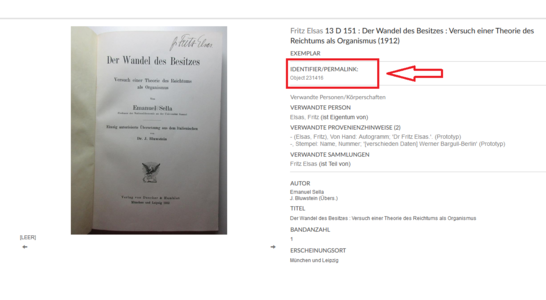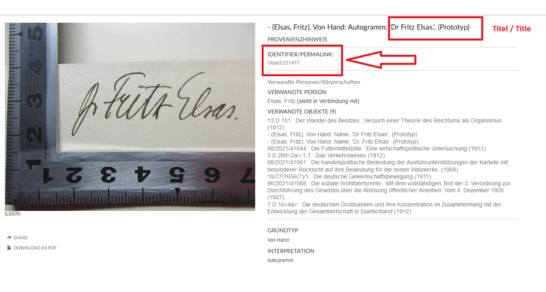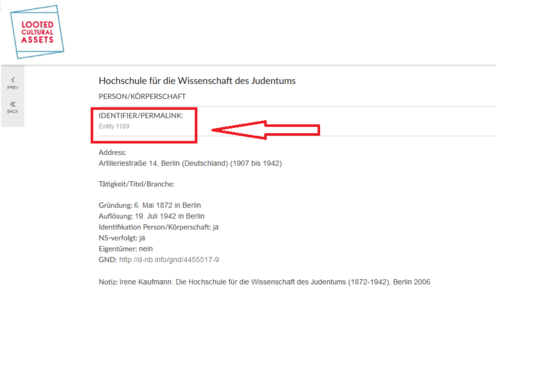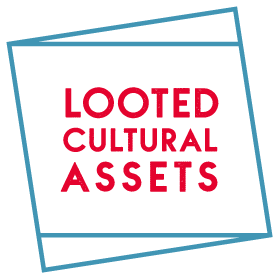FAQ
Nazi-confiscated cultural property – more precisely, cultural property expropriated in the context of Nazi persecution – comprises cultural assets that were confiscated from citizens and institutions persecuted for racial, political, religious, or ideological reasons between 1933 and 1945. The main victims of Nazi looting were the members of the Jewish population within the German Reich as well as within all territories occupied by the German Armed Forces during the Second World War. Their assets were extorted. based on discriminatory laws and ordinances, confiscated by force, or had to be sold under the pressure of persecution. Nazi loot, by contrast, is cultural property that was relocated during the war, and that includes such cultural property as was illegally looted during WW2 and brought to Germany from a conquered territory in violation of international law. Article 56 of the Hague Land Warfare Regulations of 1907, among other regulations, is the legal standard relevant here.
That conceptual distinction is irrelevant for the actual research work; however, the two terms are tied to different sets of legal conditions for the restitution of cultural property. Cultural property is not limited to valuable art objects in museums, it also includes the holdings of libraries and archives. For the original owners and their heirs, these objects represent an important non-material value. These objects can connect us to the Nazi victims or to our own family histories.
In some libraries, there are delivery lists provided by the Gestapo or entries in acquisition books that contain information about previous owners or suppliers. Countless books also became part of library holdings as "gifts" from the Nazi regime. A large part was originally Jewish property, which those who fled the country were forced to leave behind. Often, only the traces preserved in the very books in the form of stamps, autographs, dedications, bookplates, and labels give any indication of who the original owners were.
During the Nazi dictatorship from 1933 to 1945, libraries profited in various ways from raids carried out by the Nazi regime. They were beneficiaries of large stocks of illegally confiscated and looted books taken from persons and institutions persecuted for racial and political reasons. They received books and entire libraries that were brought to Germany as booty from the conquered countries of Central, Western, Eastern and Southeastern Europe during the war.
Numerous Nazi organisations were involved in the raids, such as Einsatzstab Reichsleiter Alfred Rosenberg (ERR), Sonderkommando Eberhard von Künsberg at the Foreign Office under Foreign Minister Joachim von Ribbentrop, and the Sicherheitsdienst (SD) led by Reinhard Heydrich. However, distribution to the libraries was mainly organized by an organization called "Reichstauschstelle" (Reich exchange agency), which controlled the academic library system in the Nazi state. By the end of the war, that agency had hoarded over a million volumes in numerous centers throughout Germany.
After WW2, Nazi-looted assets also found their way into libraries through purchases from antiquarians and through donations. Therefore, Nazi-looted assets and booty can also be found in libraries that were founded only after 1945. In many cases, there is no documentation about the acquisition of those books by the libraries.
We have decided to include all traces detected that point to a previous owner in the provenance database Looted Cultural Assets (LCA). You will therefore not only find objects that are classified as Nazi-confiscated cultural property / Nazi booty, but also objects the provenance of which is unknown or that are not Nazi-confiscated cultural property according to current knowledge.
We publish the most important results of our research with the intention of making this information available to provenance researchers and the general public to use.
In the "Washington Principles on Nazi-Confiscated Art" of 3 December 1998, 44 states, including the Federal Republic of Germany, agreed to actively pursue the identification, publication and restitution of Nazi-looted assets. If the previous owners or their heirs can be identified, "steps should be taken expeditiously to achieve a just and fair solution." The "Joint Declaration" of 1999 specified these points for German public institutions. The "Guidelines" and "Provenance Research Manual" provide criteria for examining individual cases, creating a basis for restitution that is generally accepted. However, the Washington Principles, as an agreement, do not legally bind the signatory states, and they are seen as a document of moral commitment.
In line with that commitment, the cooperation partners conduct research on Nazi-looted cultural property in order to identify books that have been confiscated in the context of persecution and to return them to the rightful owners or their heirs.
We publish as many research results as possible in our provenance database Looted Cultural Assets (LCA). However, in accordance with the legal provisions on data protection, we only make personal data available online that is explicitly intended for publication in order to ensure that this data is handled in a legally secure, ethically justifiable and sensitive manner. In view of the legitimate interests of the victims of the Nazi regime who are still alive today or of their relatives, we ask for your understanding if not all data can be made accessible or published.
You can search for family names, organisations, or book titles in the provenance database Looted Cultural Assets (LCA). Use the main search box to search for the desired name or go to Search in the navigation bar and select specific categories, e.g., "Persons/Organisations". The search result will include the location information for the book in question.
Do you have any questions or comments? Please feel free to use our contact form to send us a message. For further information, our cooperation partners will be happy to help you. You can contact them directly using the details provided.
Citing books from LCA database
Citing the title via the identifier/permalink from the frontend:
| structure |
|
title, website [online], identifier/permalink: xxxx. |
|---|
title = bibliographical title
object-id = identifier/permalink (Frontend)
Examples title:
| Example 1 |
| Ausführliche Bearbeitung der „Vier Monatsgegenstände“ im Pestalozzi-Fröbel-Hause : eine Ergänzung zur Kunstmappe: "Unsere Kinder" - Skizzen aus dem Pestalozzi-Froebel-Hause zu Berlin von Fritz Grotemeyer (1893), Looted Cultural Assets [online], Identifier/Permalink: |
| Example 2 |
|
Der Wandel des Besitzes : Versuch einer Theorie des Reichtums als Organismus (1912), Looted Cultural Assets [online], Identifier/Permalink: Object 231416. |

Citing the mark of provenance via the identifier/permalink from the frontend:
| Structure |
|---|
|
text of the mark of provenance, website [online], identifier/permalink: xxxx. |
text = text of the mark of provenance (can be abbreviated with [...])
object-id = identifier/permalink (Frontend)
Examples mark of provenance:
| Example 1 |
|---|
| Dr Fritz Elsas. (Prototyp), Looted Cultural Assets [online],Identifier/Permalink: Object 231417. |
| Example 2 |
| Exlibris-Nr. 067, Looted Cultural Assets [online], Identifier/Permalink: Object 11705. |
| Example 3 |
|
Nelly Wolffheim Berlin. (Prototyp), Looted Cultural Assets [online], Identifier/Permalink: Object 236855. |
| Example 4 |
|
"Meinem lieben Pflegemütterchen Frau Emilie Lederer in dankbarer Gesinnung. Leipzig, Juni 1895. [...]", Looted Cultural Assets [online], Identifier/Permalink: Object 230962. |

Citing the entity via the identifier/permalink from the frontend:
| Structure |
|
name of the entity, website [online], identifier/permalink: xxxx. |
|---|
name = full title of the entity
entity-id = identifier/permalink
Examples entity:
| Example 1 |
|---|
| Wolffheim, Nelly, Looted Cultural Assetes, [online] Identifier/Permalink: Entity 1864. |
| Example 2 |
|
Jüdische Gemeinde zu Berlin, Looted Cultural Assetes [online], Identifier/Permalink: Entity 213. |
| Example 3 |
|
Hochschule für die Wissenschaft des Judentums, Looted Cultural Assets [online], Identifier/Permalink: Entity 1189. |

In the course of our work, we check many books with handwritten notes. Many of them are difficult to read and will be put on hold for the time being. We invite you to decipher the samples of historical writing and explore the provenance research projects of our cooperation. Perhaps you also have useful information on the fate of individuals or institutions whose books are listed in our provenance database Looted Cultural Assets (LCA). We would be grateful for that, too.
If you would like to offer assistance, please write an e-mail to the cooperation partners in charge in each case.
The cooperation is an initiative carried by public institutions for the benefit of public institutions. The goal is to jointly process and document provenances and to make information accessible to interested parties. In principle, any public institution that conducts provenance research and is willing to share information not only with other institutions but also with the public can become a cooperation partner. The current focus of the work done by the participating institutions is on Nazi-looted assets research. You can download a sample of the cooperation agreement (in German only).
If you are interested in becoming a partner, please write to: kooperation@lootedculturalassets.de
